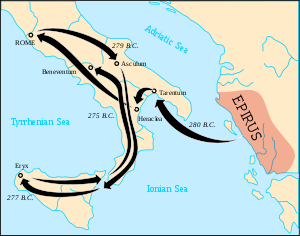Pyrrhic War
| Pyrrhic War | |||||||
|---|---|---|---|---|---|---|---|
 The route of Pyrrhus of Epirus during his campaigns in southern Italy and Sicily. |
|||||||
|
|||||||
| Belligerents | |||||||
|
ITALY Roman Republic Marsi Marrucini Paeligni Frentani Dauni Umbrians SICILY Carthage |
ITALY Greeks Epirots Aetolians Acarnanians Athamanians Thessalians Greeks in Italy Terentum Italic peoples Samnites Lucani Bruttii SICILY Same Greek forces Greek cities in Sicily |
||||||
| Commanders and leaders | |||||||
|
ROME Publius Valerius Laevinus Publius Decius Mus Publius Sulpicius Saverrio Manius Curius Dentatus CARTHAGE Unkown |
Pyrrhus of Epirus | ||||||
| Casualties and losses | |||||||
| The only known figures are for Battle of Heraclea 15,000 or 7,000 Battle of Asculum 6,000 |
The only known figures are for Battle of Heraclea 13,000 or 4,000 Battle of Asculum 3,500 |
||||||
The Pyrrhic War (280–275 BC) was a war Pyrrhus, the king of Epirus, in Greece, fought in southern Italy and Sicily.
Pyrrhus was asked by the people of the Greek city of Tarentum in southern Italy to go to Italy to help them in their conflict with the Roman Republic. War had broken out between Rome and this city. This was fourth time that the Tarentines asked for help from mainland Greece. They had called for the aid of Archidamus III of Sparta against the Messapii in 343 BC. This king fought in the region until he died in battle in 342 BC. In 333 BC they called in Alexander I of Epirus to help them in their war with their Lucani. In 330 BC Alexander also died in battle in southern Italy. Cleonymus of Sparta fought in the same region in 303-02 BC, again to help Tarentum against, again, the Lucani.
Ostensibly Pyrrhus went to Italy to help the Tarentines. Ancient historians agreed that the real motivation behind his intervention was the conquest of Italy and that he also coveted Sicily and possibly Carthage. Pyrrhus fought two battles with the support of Tarentum and some Italic peoples in southern Italy which were in conflict with Rome: the Samnites, Lucani and Bruttii. Rome fought with the support of the Italic peoples of central Italy which had become her allies during the Samnite Wars: the Marsi, Marrucini, Paeligni, Vestini and Frentani. The two opponents fought the Battle of Heraclea in 280 BC. Afterwards there were negotiations between the two parties, but these failed. There was a second battle, the Battle of Asculum in 279 BC. According to Plutarch, Pyrrhus won both battles. According to Cassius Dio, the Romans won the second battle. Dionysius of Halicarnassus did not state what the outcome of the second battle was. In both battles both sides lost a large amount of men. Pyrrhus relied on nineteen war elephants which he brought to Italy which wreaked havoc in the Roman ranks and killed many of their soldiers. The Romans had never seen elephants before and were frightened by them.
...
Wikipedia
